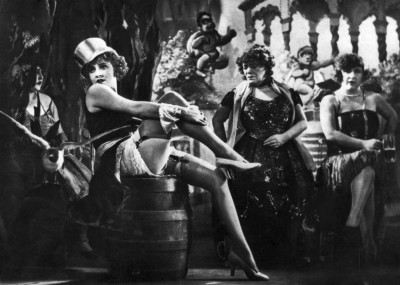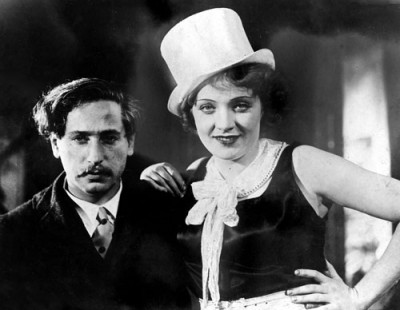
No one is likely to challenge the position of Josef von Sternberg’s The Blue Angel as one of the great classics of film. Certainly, I’m not going to. It was my first exposure to Sternberg when I was in high school — and for that I am eternally grateful. I will say, however, that I liked it better then than I do now. At the time, I was fascinated by it — in part because its somewhat clunky early sound technique made it seem like a look into another world. It is, in fact, clunkier than Sternberg’s first talkie — the Hollywood-made Thunderbolt (1929). But the rarely revived Thunderbolt lacks a specific aspect of The Blue Angel — Marlene Dietrich. And more than that — the electricity that was generated by the combination of star and filmmaker. As you can see from the photo of Sternberg and Dietrich above, this isn’t the Dietrich of their Hollywood films, but the seed of what would happen in their next six films was there. In fact, it was so much there that Sternberg seems to have lost interest in his titular star Emil Jannings, and lavished all his attention on Dietrich.

The problem I have with the film today is that I don’t like it as well as the films that followed it. Despite its undeniable artistic merits and the fascination of seeing what a German cabaret really looked like (a much grubbier place than the Bob Fosse version), it has a Dietrich who is a diamond in the rough. Paramount must have realized this, because they held up the U.S. release of The Blue Angel until the more sophisticated Dietrich (billed as “the woman all women want to see,” no less) had been introduced to them in Sternberg’s Morocco (1930). But for all that, The Blue Angel remains an important film — and probably a more realistic one than those that followed it. Dietrich’s Lola Lola is certainly a fascinating creature — even if her single-minded determination to degrade the lovestruck elderly Prof. Rath (Jannings) lacks the shadings and nuances that would come. It’s almost as if Sternberg was envisioning just how dangerous the actress could be to him in the bargain — and the truth is that as wonderful as the films they made together were, Sternberg would pay a price for his obsession with his protege. After it was over, Dietrich would have a great career before her, but Sternberg would never again have the freedom or resources to make anything like those films.
The Hendersonville Film Society will show The Blue Angel Sunday, May 5 at 2 p.m. in the Smoky Mountain Theater at Lake Pointe Landing Retirement Community (behind Epic Cinemas), 333 Thompson St., Hendersonville.




Before you comment
The comments section is here to provide a platform for civil dialogue on the issues we face together as a local community. Xpress is committed to offering this platform for all voices, but when the tone of the discussion gets nasty or strays off topic, we believe many people choose not to participate. Xpress editors are determined to moderate comments to ensure a constructive interchange is maintained. All comments judged not to be in keeping with the spirit of civil discourse will be removed and repeat violators will be banned. See here for our terms of service. Thank you for being part of this effort to promote respectful discussion.